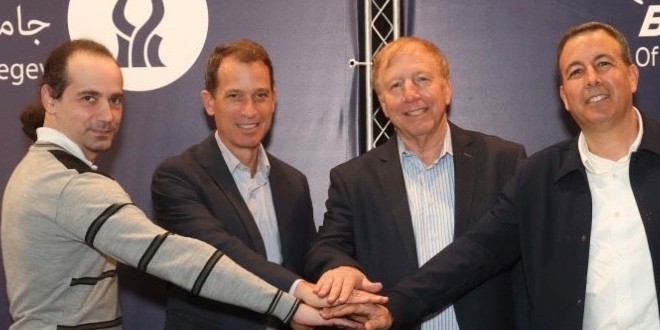The US and Israel have now set up a consortium to provide cyber protection of energy sources and facilities in the two countries. Called ICERDE, it will focus on the promoting research and development in this field. Israel is considered one of the world’s top countries developing tools to ensure cybersecurity.
It is part of the US-Israel Energy Center managed by the BIRD Foundation (Israel-United States Binational Industrial Research and Development Foundation), which provides capital for joint industrial research and development between American and Israeli companies. BIRD was established in 1977 by the US and Israel governments
The new consortium was chosen by the Israeli and US Ministries of Energy and the Israeli Innovation Authority and is being led by Ben-Gurion University BGU) of the Negev in Beersheba, along with Arizona State University in the US.
The consortium aims to promote joint research and development with cooperation among companies, research institutes and universities in Israel and in the US, as well as accelerate the development of new products that will provide solutions to rising cyberthreat levels
The consortium will receive up to $6 million over the next three years through the US-Israel Energy Center, for joint US-Israel R&D projects. Total investment is estimated to reach $12 million, including funds from participating institutions. Dr. Rami Puzis and Prof. Dan Blumberg and Prof. Yuval Elovici from BGU will lead the research. Total investment is estimated to reach $12 million, including funds from the participating institutions.
The frequency and scale of cyberattacks on energy facilities is on the rise, and many countries are seeking new and efficient methods for protecting critical resources such as water, electricity and gas, as well as the facilities that produce, dispense and store energy. According to a report of the World Economic Forum published in 2020, cyberattacks on critical infrastructure facilities ranks fifth in terms of the level and number of threats.
This high threat level prompted the two governments to acknowledge the urgent need to invest resources to minimize the danger and the scope of potential damage. The climate crisis also highlights the need to recruit the most accomplished researchers to develop products and services to deal with the effects of climate change. To protect energy facilities, the consortium will initiate projects focusing on all manufacturing stages, as well as storage and energy distribution. The consortium provided a detailed work plan based on comprehensive research by American and Israeli researchers.
Dr. Rami Puzis of BGU’s department of software and information systems engineering, said: “ICRDE aims to promote joint R&D for protection from energy-related cyberthreats and will encompass these categories – establishing a database of cyber-physical system (CPS) attacks on energy facilities and simulation of these attacks in a controlled research environment; development of technology and advanced tools for monitoring and correlating the information technology (IT) and the operational technology (OT) layers of Industrial Control Systems (ICS) to protect energy infrastructures from attacks. Joint teams will develop, assess, and incorporate new technologies developed by the consortium members, transforming them into cybersecurity solutions for Israel and the US.”
Consortium members include Israeli and American companies as well as government and research institutions. Activities will be led by BGU alongside Arizona State University. Among the US partners are the Georgia Institute of Technology, Nexant, Delek US, Duquesne Light Company, Schweitzer Engineering Laboratories and the MITRE Corporation. The Israeli partners include Otorio, RAD, SIGA OT Solutions, Arava Power, DK Innovation and Meptagon.
Josh Peleg, CEO of BGN Technologies – BGU’s the technology transfer company that brings technological innovations from the lab to the market and fosters research collaborations and entrepreneurship among researchers and students – commented: “Choosing BGU to lead the binational Israel-US consortium for cyber-protection of energy infrastructure is another validation of BGU’s leadership both in the cyber and energy arenas. We look forward to a fruitful research collaboration between the industry and the Israeli and US research institutions consortium members, leading to invention, development and marketing of vital solutions, now and in the coming years, for cyber-protection of essential infrastructure.”
Dr. Eitan Yudilevich, executive director of the BIRD Foundation, said: “We congratulate BGU, Arizona State University and all the partners in the Israel-US consortium for winning the US-Israel Energy Center grant and for the impressive organization leading to a successful launch of activities. We believe that the products of this collaboration between Israeli and American innovation will have significant impact on the ongoing efforts against cyberthreats on energy infrastructure in both countries.”
The shortcode is missing a valid Donation Form ID attribute.



